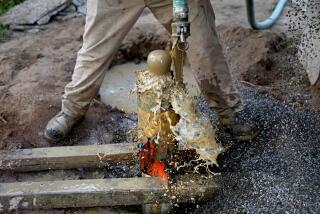Drought Relief Bill Is Passed, Sent to Reagan
- Share via
WASHINGTON — The House approved a $3.9-billion aid package for drought-stricken farms Tuesday and sent the measure to President Reagan, who made it known he intends to sign it.
“We have kept the faith,” Agriculture Committee Chairman E. (Kika) de la Garza (D-Tex.) said as the House passed the bill 383 to 18. “To all who will be helped by this legislation, our promise has been kept.”
There was only brief debate on the measure, which emerged from a House-Senate conference committee last week and won Senate approval on Monday. Congress raced to put the legislation on Reagan’s desk before a three-week break begins Friday, and presidential spokesman Marlin Fitzwater told reporters hours earlier there was no doubt that Reagan will sign it.
The bill calls for government payments to farmers who have lost more than 35% of their crops to drought, hail, excessive moisture or related damage, such as that caused by insects. The payments would be equal to 65% of losses in excess of the 35%.
Extra for Midwest Area
Additional payments would be available to those farms hit hardest by the heat and lack of rainfall that have seared fields in the Midwest.
The major beneficiaries of the aid in California--in its second year of drought--will be the dairy farmers who produce the state’s leading commodity, valued at more than $2 billion. They will share about $19 million in additional milk price support payments next spring, according to one government estimate.
Federal milk payments, which had been scheduled to drop by 50 cents per 100 pounds of dry milk next Jan. 1, will not be reduced. Payments instead will be increased by 50 cents for three months starting next April, to offset higher feed costs caused by the grain shortage this year.
Other potential beneficiaries in California are certain cattle ranches and non-irrigated grain farms. These are mostly in the northern counties, but some are in Riverside and San Bernardino counties, a spokesman for the state Department of Food and Agriculture said.
Nationwide, the measure would make feed assistance available for varieties of livestock including cattle, sheep, goats, pigs, poultry and horses used for food or in food production.
Few Spending Gripes
Bills involving major farm subsidies have come in for substantial criticism on fiscal grounds from urban lawmakers in recent years, but the drought measure drew few such complaints.
Rep. Robert S. Walker (R-Pa.) did complain about a $5.5-million authorization in the measure for a temperature-control system to aid salmon spawning in California’s Sacramento River.
“So the bill is going to take care of yuppies, too, and make sure their salmon mousse supply is not interfered with?”
More to Read
Get the L.A. Times Politics newsletter
Deeply reported insights into legislation, politics and policy from Sacramento, Washington and beyond. In your inbox twice per week.
You may occasionally receive promotional content from the Los Angeles Times.










